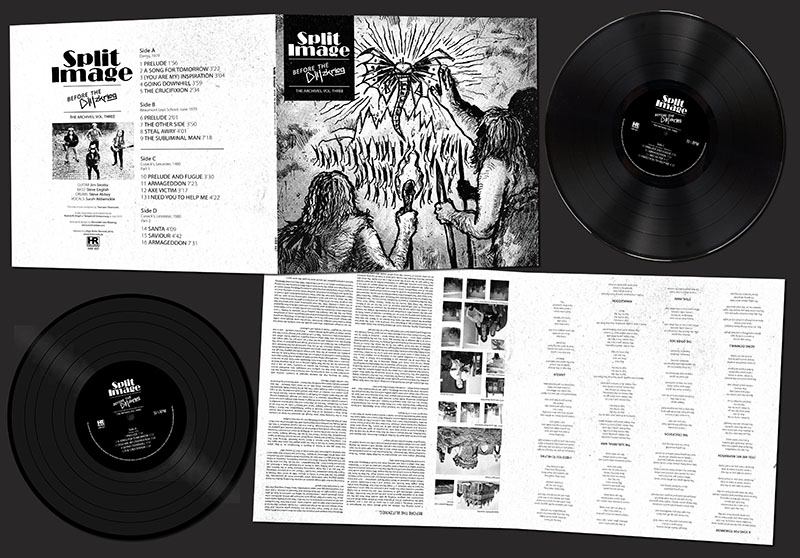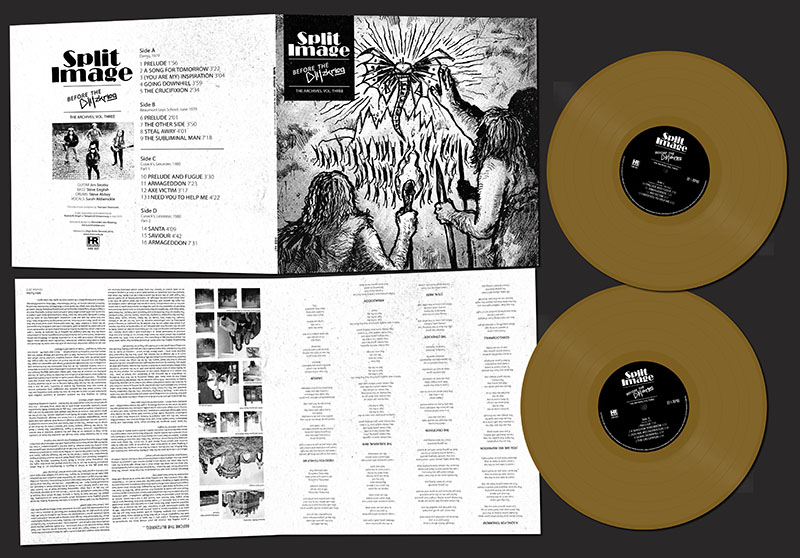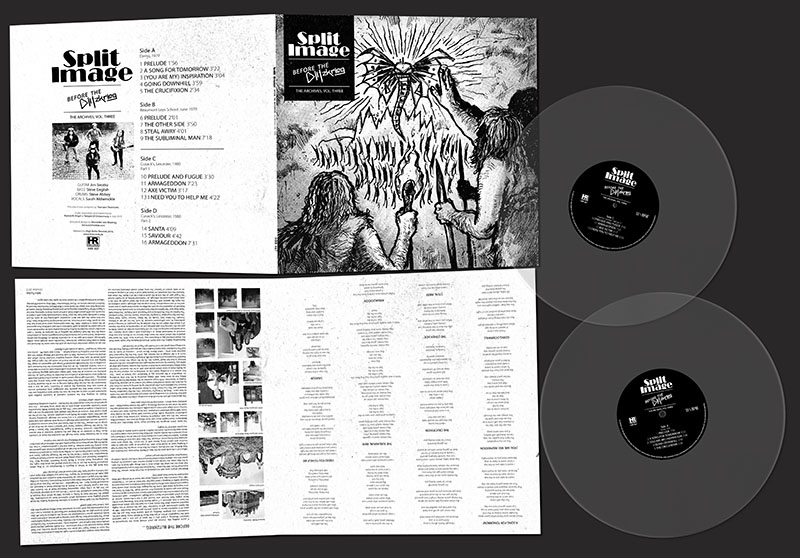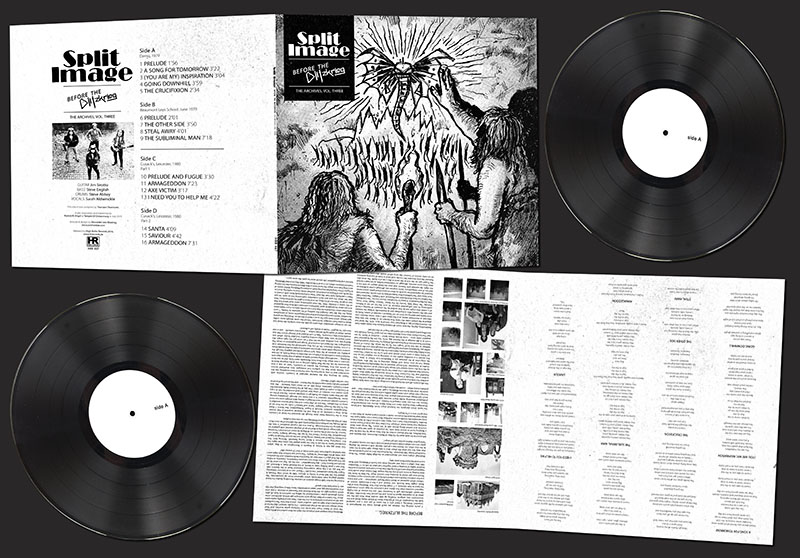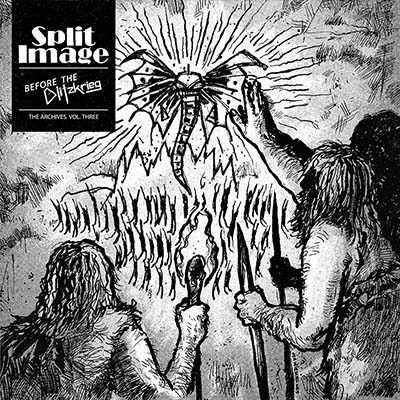 | ||||
| SPLIT IMAGE - Before the Blitzkrieg - The Archives Vol. 3 DLP | |
HRR 467, ltd 500, 100 x transparent ultra clear, 200 x black + 200 x gold vinyl, gatefold cover | |
| Sarah Aldwinckle - vocals Jim Sirotto - guitar Steve English - bass Steve Abbey - drums | |
| -Prelude (Demo 1979) -A Song For Tomorrow (Demo 1979) -(You Are My) Inspiration (Demo 1979) -Going Downhill (Demo 1979) -The Crucifixion (Demo 1979) -Prelude (Beaumont Leys School June 1979) -The Other Side (Beaumont Leys School June 1979) -Steal Away (Beaumont Leys School June 1979) -The Subliminal Man (Beaumont Leys School June 1979) -Prelude And Fugue (Cussacks Leicester 1980) -Armageddon (Cussacks Leicester 1980) -Axe Victim (Cussacks Leicester 1980) -I Need You To Help Me (Cussacks Leicester 1980) -Santa (Cussacks Leicester 1980) -Saviour (Cussacks Leicester 1980) -Armageddon (Cussacks Leicester 1980) | |
SOLD OUT! | |
If you’re reading this, chances are you’ll already know the background to Leicester’s Blitzkrieg, a band who in the space of just over a year captured both the imagination of fans of the New Wave Of British Heavy Metal and the movement’s very zeitgeist. Hooking up with vocalist Brian Ross put the last piece of an expansive jigsaw in place, and the period from November 1980 to the band’s unfortunate split in December 1981 saw the release of two highly regarded cassettes (their first demo, and a six-track live tape which showcased the band in their element), a 7” single ‘Buried Alive’ b/w ‘Blitzkrieg’ (one of the finest singles Neat Records ever issued) and a live-in-the-studio version of ‘Inferno’ which appeared on Neat’s ‘Lead Weight’ compilation – each and every one firm evidence that this was a band with hunger and talent in equal measure. They’d even got round to demoing their second single ‘Too Wild To Tame’ but were hoping to move with it into the big league. Who knows what would have happened had that come off, but by this time disenchantment, weariness and the financial reality of keeping a band together had taken its toll; on 17 December 1981 they called it a day, and nothing more was heard of Blitzkrieg until Brian reactivated the band three years later.
Blitzkrieg’s origins were well documented on the High Roller release ‘The Boys From Brazil Street; 1981 Revisited – The Archives Vol. One’, so you’ll probably know that story too; but what this album does is take things right back to the start, to the days when Jim Sieroto was a physics teacher with a passion for playing guitar who was asked to help a school band out and, in his own words, ended up “nicking their rhythm section and girl singer.”
Influenced in his early years by the likes of Ritchie Blackmore, Jimi Hendrix and Tony McPhee, Jim had already written his first three songs by the time he had a fledgling band to record them with. “I’d acquired an open reel tape-to-tape machine and started doing demos with it,” Jim recalls. “My songs were more rock/pop than heavy metal, although ‘The Other Side’ was kind of Trower meets Hendrix, ‘Subliminal Man’ had a very heavy intro and bits of the JG Ballard short story narrated in the middle section, and ‘Now She’s Gone’ never made it past the demo stage because the drummer couldn’t do 6/8 time! A shame, as there was a nice guitar solo in it,” he laughs.
The band, which alongside Jim featured singer Sarah Aldwinckle, and future Blitzkriegers Steve English (bass) and Steve Abbey (drums) was christened Blue Demon, but this was soon changed to Horizon, and before they made it to a professional recording studio they’d become Split Image. But no matter how much Split Image rehearsed and played, Jim’s focus became more and more on having a male singer and a twin-guitar profile, and it was this that would sow the seeds for what was to become Blitzkrieg, a path the female-fronted Elixir – and probably many others – would also follow a few years later.
This album kicks off with the band’s first recordings under the name Split Image, and their first time in a recording studio which saw them emerge with five tracks to their name – ‘Prelude’, ‘A Song For Tomorrow’, ‘(You Are My) Inspiration’, ‘Going Downhill’ and ‘The Crucifixion’. Prior to these recordings the band (then called Horizon) had dabbled with a five-piece line-up by adding guitarist Jez Allen, but by the time the newly-named Split Image had rocked up at Leicester Recording Studios in September 1979 they’d reverted to the Aldwinckle/Sieroto/English/Abbey line-up once more, with Abbey returning to the fold after tendering his resignation at the previous gig at Beaumont Leys School in June. “Our first session in a recording studio saw us reverting to our original line-up, but we finally chose a name which would stick with us for the duration.” Drummer Steve Abbey had returned to the fold in time for the session, having quit after an earlier gig. “Apparently someone had bought him enough beer over the summer holidays to lure him back!” laughs Jim. “As for the songs, the chorus of ‘Going Downhill’ featured one of my favourite riffs, ‘A Song For Tomorrow’ sounded pretty much as it did onstage at the Horizon gig, while ‘You Are My Inspiration’ had acquired some lyrics – some Minnie Mouse lyrics! – courtesy of Sarah. So too had ‘The Crucifixion’: how many Hendrix titles can you spot? Finally, ‘Prelude’ was sounding pretty good, but it still hadn’t got ‘Fugue’ on the end yet.”
Backtracking slightly, the next clutch of material features four tracks taken from the aforementioned gig at Beaumont Leys School in June 1979. The band had played at the school under the name Blue Demon on 22 March, but now they returned, as mentioned above, as a five-piece with a new name: Horizon. Like most bands just starting out their set still featured a number of covers, firstly to pad out the running time and perhaps just as importantly to keep the interest of a crowd who might not be that excited by the prospect of hearing a band performing its own self-penned material. As such, the full set ran as follows: ‘Prelude’, ‘The Other Side’, ‘Smoke On The Water’, ‘Saviour’, ‘Eagle’, ‘Steal Away’, ‘(You Are My) Inspiration’, ‘A Song For Tomorrow’, ‘Doctor Doctor’, ‘The Crucifixion’, ‘The Subliminal Man’, ‘Rock Bottom’ and ‘Paranoid’, with ‘Prelude’, ‘The Other Side’, ‘Steal Away’ and ‘The Subliminal Man’ featured here. In Jim’s words, the band now featured “an expanded line-up with Jez Allen on second lead guitar, a new name, and lots of new compositions. Some surprises too, although a poor audience on the night. We opened with ‘Prelude’, and once the band caught up with me it does show some promise, although, as I mentioned before, as we hadn’t tacked the ‘Fugue’ part on the end at this point it dies a bit of a death. The show also featured the only recorded Jim Sieroto lead vocal in front of a paying audience on an early version of ‘Saviour’, the song which would ultimately become our Blitzkrieg show-stopper and where on the night Jez Allen pulled out all the stops. The cover of Abba’s ‘Eagle’ had some nice harmony guitar touches, and ‘Steal Away’ always reminds me of that old maxim – if in doubt, boogie! I did the band introductions that night as well – another rarity – and at that time ‘The Crucifixion’ was still an instrumental tribute to Jimi Hendrix. There was a lengthy explanation about ‘The Subliminal Man’: things were starting to get serious, and there’s some lovely glissando guitar. I remembered Jez telling the audience to fuck off, after which (surprisingly) we did ‘Rock Bottom’ and ‘Paranoid’ as encores. It was a bit of an experimental gig, and I seem to remember Steve Abbey resigning after this one. It must have been good!”
Following the first Split Image sessions at Leicester Recording Studios the band started gigging more extensively which tightened them up considerably. “We played the Old Bell Hotel in Derby in January 1980 by which time ‘Prelude & Fugue’ had been completed,” Jim recalls. “7 March saw us at Leicester University, our first gig on a big stage, supporting Diamond Head at the Queen's Hall. That was a great feeling! Later in March, at the Monsall Head, in Bakewell, we introduced ‘Atomic Rain’ – aka ‘Armageddon’ – into the set. That was what I’d call our first good gig. And then there was Lancaster Polytechnic, Coventry, on 6 May 1980, the final gig of a mini-tour: we found that both monitors and the previous gigs make all the difference,” he laughs. “The band was brilliant that night and I was hailed as a guitar hero. Did I want more of this? Of course I did.”
One more gig was to follow, at Bogart’s in Birmingham on 10 May, which introduced ‘Santa’ to the set. In fact the band played two stints that night, the first comprising ‘Don’t Believe A Word’, ‘Going Downhill’, ‘Wishing Well’, ‘The Crucifixion’, ‘Paranoid’ and ‘Living Loving Maid’, and the second ‘Prelude & Fugue’, ‘Armageddon’, ‘Axe Victim’, ‘I Need You To Get Me Through Tonight’, ‘Santa’ and ‘Saviour’. By the end of the month, on 30 May to be exact, at Leicester’s Fosseway Hotel Split Image would play its first full set of original material, with guitarist Ian Jones joining the band onstage. “A poor mix but a good reception,” is how Jim recalls the gig, but perhaps more importantly, with the addition of Ian Jones four-fifths of that stunning original Blitzkrieg line-up was now in place.
Prior to the Fosseway Hotel show though Jim recorded the band at Cussack’s Music Shop in Leicester on 24 May, and the material recorded at that session (‘Armageddon (version)’, ‘Prelude & Fugue’, ‘Armageddon’, ‘Axe Victim’, ‘I Need You To Get Me Through Tonight’, ‘Santa’ and ‘Saviour’) make up the final set of songs on this release. “This was an after-hours and very loud session recorded in Cussack’s upstairs rehearsal room through a mixing desk straight onto two-track stereo. ‘Armageddon (version)’ is a very loose run through containing tuning-ups and false starts, before we finally get a complete version. The rest of the set gives crystal clear versions of songs later played (and recorded by me) at a gig in Coventry a couple of weeks later.” (This gig, at the General Wolfe, featured the entire Cussack’s repertoire, along with an Ian Jones’ song ‘Jealousy’ – the new guitarist had also been responsible for ‘Axe Victim’ – and the unveiling of another new number called ‘Inferno’.)
There’s no denying that the material captured at Cussack’s crackles with excitement and it’s easy to see how by now the band were morphing into this new, heavier beast that the guitarist had envisaged. Jim’s shorthand version of events was that, following the session at Cussack’s, “next up was a new Stratocaster for me, the Les Paul finally coming to rest at the Imperial Hotel in Leicester, a new singer Brian Ross from Newcastle-upon-Tyne, and so was born Blitzkrieg…” and although things weren’t quite as simple as that Sarah’s days with the band were numbered. In a fashion not dissimilar to Deep Purple, as Jim was probably not unaware at the time, Split Image continued gigging through the summer evenings while at the same time auditioning male vocalists to take them in a new, heavier direction. On 29 July they auditioned the first frontman and, according to Jim, the band talk consisted of “image and aggression on stage. The feeling was very positive, and we felt that if we could get the right singer, the world would be ours. New songs coming together included ‘Snake’, which was already becoming a favourite, ‘Take A Look Around’ and ‘Vikings’ which I felt was streets ahead of anything I’d written before … And a new turbo PA – and a new hairstyle,” he laughs – “made us totally self-sufficient.”
Jim can no longer remember who came up with the new name for the band, but thinks it came from manager Jez Gilman. “I loved the name straight away: unlike Split Image, which took ages for us as a band to decide on, Blitzkrieg was pretty immediate.” And it wasn’t just the band that had changed its name, as somewhere along the line Jim had changed the spelling of his surname to Sirotto. “I can’t remember when I decided to do that, but it was pretty early on. It just made sense as it was easier for people to spell.” Auditions continued until Brian Ross appeared on the scene in October 1980. “We tried auditioning some local talent but that was no good. Then out of the blue, Jez and Steve English found Brian Ross. I first met him down the pub and don’t remember auditioning him as such. He just fitted in perfectly right from the start.” Brian had previously been with a band in the north-east of England called Anvil, and had come close to replacing Jess Cox in Tygers Of Pan Tang before moving south and joining Blitzkrieg. Within weeks of recruiting their new singer the band were in Rick Wilson’s Humbucker Recording Studio in Leicester where, on 15 and 16 November 1980, they recorded ‘Blitzkrieg’, ‘Inferno’ and ‘Armageddon’. Life would never be quite the same again…
John Tucker
October 2015
